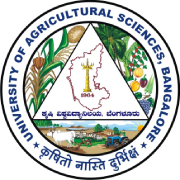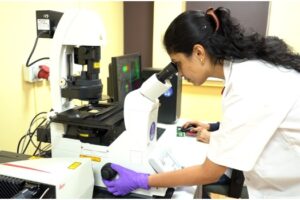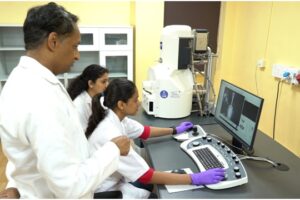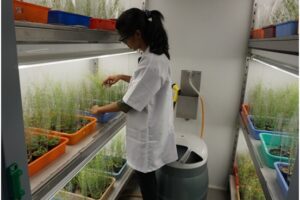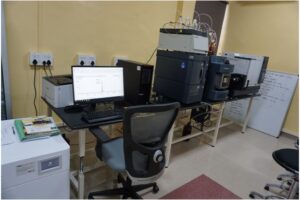The Department of Crop Physiology at the University of Agricultural Sciences, Bangalore, was officially established in 1976. Its primary goal is to provide undergraduate and graduate programs in Crop Physiology and to conduct research in this field. The department specifically emphasizes “crops” rather than generic “plants,” highlighting its commitment to improving agricultural productivity. Since its inception, the department has continually refined its teaching and research initiatives to focus on crop physiology, making significant contributions to the advancement of crop science and productivity.
A key area of research at the Department focuses on understanding how plants respond to various stresses. Specifically, the major program aims to provide fundamental insights that can be leveraged in breeding crop plants with enhanced tolerance to drought and other environmental challenges. Over the years, the department has made significant progress in exploring the physiological mechanisms behind plant responses to drought and combined stresses, particularly drought and high temperatures. Many crop germplasm and segregating materials exhibiting moisture stress tolerance have been characterized, and key traits contributing to drought tolerance have been identified.
In addition to contributing to traditional and molecular breeding methods, the Department also delved into cutting-edge molecular physiology techniques. These include prospecting novel genes contributing to moisture stress tolerance, employing advanced methods like post-transcriptional gene silencing for gene characterization, and transgenic and gene editing approaches. The department also focuses on identifying QTLs and genes associated with important traits like water-use efficiency and root characteristics.The Department has developed transgenic crops across various species, such as rice, peanuts, mulberry, etc., with a focus on understanding the relevance of specific traits and also to enhance moisture stress tolerance. In addition to crop improvement research in major crops such as rice and finger millet, efforts are also being made to enhance the grain quality of field crops. The Department has lately started studies on hologenome manipulation after realizing the importance of the hologenome in physiological processes.
The department’s research efforts have gained recognition both nationally and internationally. In 2006, the Department of Biotechnology, Government of India, established a DBT-Centre for Drought Research. Following this, the Indian Council of Agricultural Research (ICAR) supported a Niche Area of Excellence in Drought Research program. The department implemented a collaborative HRD and research program supported by the World Bank as part of the ICAR-Centre for Advanced Agricultural Science & Technology (CAAST) project. These initiatives have facilitated networking and knowledge generation. The faculty is strongly supported through extramural research grants from both National and International funding mechanisms.
Over the years, the Department has strengthened its research facilities. It includes a dedicated plant molecular biology facility and containment facilities for functional validation of genes and evaluation of transgenic crops. The Department also houses a Facility for Isotope Ratio Mass Spectrometry (IRMS) and field phenotyping (phenomics) facilities, serving as a central hub for studies on abiotic stress physiology. The phenomics facility is specifically used to characterize germplasm and breeding materials for drought tolerance. The Department has contributed to establishing a Central Instrumentation Facility that features advanced instruments such as a scanning electron microscope, confocal microscope, and liquid chromatography with tandem mass spectrometry (LC-MS-MS). Comprehensive field facilities, including rain-out shelters, managed drought environments, and root study structures, are available for both research and teaching.
The Department has become a major national center for teaching and research in Crop Physiology. It offers seven courses for various undergraduate programs, 12 for Master’s degrees, and 10 for PhD students. Over 200 students have earned their Master’s degrees, and 81 have completed their Doctoral degrees through the Department. Most graduates find positions in national and international research institutions, state departments of agriculture, and the private sector, consistently demonstrating high standards of performance and excellence. The Department is currently hosting five world-renowned scientists from abroad as adjunct faculty.
Dr. Nataraja Karaba N
Professor & Head,
Department of Physiology,
College of Agriculture, University of Agricultural Sciences Bangalore (UASB), GKVK, Bengaluru 560 065
nataraja_karaba@yahoo.com; nnkaraba@uasbangalore.edu.in
+91-80-23636713 (Extn- 376)
Faculty

Qualification: M.Sc. (Agri.), Ph.D. in Crop Physiology
Specialization: Molecular Basis of Drought Tolerance in Crops, Trait Manipulation Using Endophytes

Qualification: M.Sc. (Agri.), Ph.D. in Crop Physiology
Specialization: Molecular Breeding for Drought Tolerance withspecial emphasis on MAS for Water Use Efficiency
+91-9972308219

Qualification: M.Sc. (Agri.), Ph.D. in Crop Physiology
Specialization: Drought and Water Use Efficiency,Plant Phenotyping, Doubled Haploidy, Reproductive Biology

Qualification: M.Sc. (Agri.), Ph.D. in Crop Physiology
Specialization: Plant Stress Physiology, Plant Functional Genomics
Laboratory Photos
-
- ಪುಟ ಸಂದರ್ಶಕರ ಸಂಖ್ಯೆ:
- ಕೊನೆಯದಾಗಿ ನವೀಕರಿಸಲಾಗಿದೆ: ಮಾರ್ಚ್ 19, 2025
- ಸೈಟ್ ಅಂಕಿಅಂಶಗಳು
